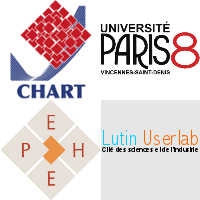Organizing Committee : Jean Baratgin, Marc Bui & Sacha Bourgeois Gironde
PROGRAM
9h Introduction Jean Baratgin CHArt (PARIS)
9h10 – David Over, Durham University
The « defective » truth table : Its past, present, and future.
In the so-called « defective » truth table, a conditional, if p then q, is held to be true in the p & q cell, false in the p & not-q cell, and to have some other, third value in the not-p cells. Wason (1966) was the first psychologist to refer to what came to be known as the « defective » truth table, although he did not use the term « defective » for it. Johnson-Laird & Tagard (1969) said more about it, and noted that it had been proposed earlier by the philosophers Quine (1959) and Kneale & Kneale (1969). Johnson-Laird & Wason (1970) appear to have been the first psychologists to use the term « defective » for the table. We will point out that this table was proposed much earlier by de Finetti (1936) and discuss why it should be called the « de Finetti » table. We will also address a surprisingly neglected question in the psychology of reasoning, « What exactly is the third value ? » We will quickly summarize our recent research which interprets the third value as uncertainty. We will argue that future research should refine this notion of uncertainty into degrees of probability. The new focus should be on the « Jeffrey » table, in which the uncertainty value in the not-p cells becomes the conditional probability of q given p, P(q|p).
9h 50 – Igor Douven, Sciences, Normes, Décision (SND)
Vagueness, Graded Membership, and Conceptual Spaces.
This paper is concerned with a version of Kamp and Partee’s account of graded membership that relies on the conceptual spaces framework. Five experiments are reported, two to construct a particular shape space, two to detect which shapes representable in that space are typical for certain sorts of objects, and one to elicit degrees of membership for the various shapes from which the shape space was constructed. Assuming Kamp and Partee’s proposal, the first four experiments yield predictions regarding the degrees to which people will judge the shapes in the shape space to be members of certain classes. These predictions are confronted with the degrees observed in the last experiment, thereby yielding a test of the account of graded membership at issue. The outcome of this confrontation supports the conceptual spaces version of Kamp and Partee’s account of graded membership.
10h 30 – Stephan Hartmann, Munich Center for Mathematical Philosophy
Bayesian Argumentation.
I will sketch a Bayesian theory of argumentation. According to this theory, an agent has prior beliefs about some propositions A, B,. . . These beliefs are represented by a probability distribution P. The agent then learn the premisses of an argument from some information source. She may, for example, learn that A is the case and that A implies B. This amounts to the following constraints on the agent’s new probability distribution P’ : P’(A) = 1 and P’(B|A) = 1. The full new probability distribution is then determined by minimization of the Kullback-Leibler divergence between P’ and P. One then obtains P’(B) = 1 as one would expect from modus ponens. In a similar way, one can examine the inference patterns modus tollens, affirming the consequent, and denying the antecedent. This approach can be generalized in many respects. The agent may, for example, not fully trust the source that A is true and only assign a very high new probability to A (in the case of modus ponens). Or she may have beliefs about a disabling condition D that inhibits B. In this case she only learns (or so I argue) that P’(B|A and non-D) = 1 where the variable D has to be properly integrated into a causal Bayes net. Finally one may want to study alternatives to the Kullback-Leibler divergence and explore what follows from these measures. All this will, or so I hope, nicely connect to empirical studies.
11 h 10 Yan Ping Xin, Dept. of Educational Studies Purdue University
A Preliminary Discourse Analysis of Constructivist-Oriented Mathematics Instruction for a Student with Learning Disabilities.
Reform efforts in mathematics education arose, in part, in response to constructivist works on conceptual learning. However, little research has examined how students with learning disabilities (LD) respond to constructivist-oriented instruction in mathematics,
particularly in moment-to-moment interactions. To understand the nature of constructivist–oriented mathematics instruction involving students with LD, we conducted a case study to analyze teacher-student interactions during constructivist-oriented small group instruction involving a student with LD. The student demonstrated, to a certain degree, the ability to reason mathematically when provided with appropriate opportunities and prompting. However, given the limited intervention time, his reasoning and problem solving did not seem to go beyond the semiconcrete level of operation, which may have inhibited his solving of complex word problems with large numbers. Findings indicate that more efforts are needed to support students, those with LD in particular, in their transitions from concrete/semiconcrete to abstract conceptual understanding and problem solving. During the presentation, I will also discuss potential future analyses of how teacher-student discourse moves impact on students’ reasoning and problem solving.
It will take place in Paris, at:
Cité des sciences et de l’industrie de la Villette, Salle ean Painlevé, level -1
30, avenue Corentin Cariou 75019 Paris
Nearest metro station: Porte de la Villette.
You can download the announcement in pdf format below:

